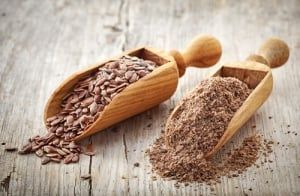Flax Seeds Benefits for Health | Nutrition Guide 2025

Many health care professionals are known to recommend that people take flaxseeds. These flaxseeds can be added to the foods you consume, for example, in your breakfast. This is advised because having flaxseeds in your diet is linked to getting a lot of health benefits due to the immense amounts of healthy nutrients that are present in them. Flaxseeds are often referred to as some of the major sources of vital nutrients, which, when added to your daily diet, can benefit your health.
This article will help you to get a detailed idea of why you need to have flaxseeds in your diet, some of the health benefits that you may derive from flaxseeds, the possible side effects, and many other related details.
Why do you need to have flaxseeds in your diet?
Flaxseeds are brown to golden colored, tiny seeds that can be consumed either raw or can be more delicious when sprouted or ground into a meal. The reason why many experts recommend you to have flaxseeds is that they are rich in nutritional content. When you consume flaxseeds, the body absorbs the nutrients that are present in them, such as vitamins, minerals, antioxidants, and various types of essential plant-based compounds. Some of the major vitamins found in flaxseeds include B vitamins in the form of thiamin, which helps to convert nutrients into energy.
Flaxseeds are also rich in minerals such as magnesium, which is crucial for the wellness of your nerves, muscles, and immune system. Other minerals that are found in flaxseeds include iron, manganese, calcium, potassium, sodium, and so on. Moreover, flaxseeds are some of the major sources of dietary fiber and plant-based protein components. Apart from having zero cholesterol content, flaxseeds are rich in healthy fats such as omega-3 fatty acids, along with other beneficial components such as alpha-linolenic acid and lignans. So, considering all these types of health benefits, it is vital for you to add flaxseeds to your diet.
What are the health benefits of having flaxseeds in your diet?
Various types of health benefits can be derived due to the rich nutrient content of flaxseeds. Some of the most common of them can be listed here as follows:
1. Flaxseeds help improve your digestive system.
People who suffer from various types of digestive conditions should consider having flaxseeds in their diet. Flaxseeds are some of the major sources of dietary fiber. They consist of both soluble and insoluble fiber, which aid in better movement of bowel through the gastrointestinal tract.
Apart from softening stool, the high amount of fiber content in flaxseeds helps to prevent the chances of developing conditions like constipation. Insoluble fiber found in flaxseeds also helps to add bulk to stool. The nutrients that are found in flaxseeds also help in managing your body weight by allowing better metabolism and giving you a sense of feeling full, so there is no chance of weight gain through binge eating.
2. Flaxseeds are rich in omgea-3 fatty acids:
Flaxseeds are some of the major sources of healthy fats such as omega-3 fatty acids, which are often considered by experts as some of the most vital polyunsaturated fats that can help prevent the risks of developing heart disease and various types of severe cardiovascular diseases such as stroke. Apart from these, flaxseeds are also rich in alpha-linolenic acid or ALA, which is another type of omega-3 fatty acid. This component in flaxseeds can reduce the risks of heart diseases, chances of developing high levels of cholesterol, and thus help to protect your heart health. These components in flaxseeds are also beneficial for improving diabetic conditions.
3. Flaxseeds can help control blood sugar levels.
Many health care professionals recommend that people have flaxseeds in their diet to control blood sugar levels. When you have conditions like type 2 diabetes or high blood glucose levels, then having flaxseeds can help counteract the effects. This is because having flaxseeds in your diet while you are having conditions like type 2 diabetes or have tendencies of developing high blood sugar-related diseases, then the nutrients that are present in them can help in the improvement in insulin sensitivity in your body.
4. Flaxseeds help in healthy weight management:
Are you somebody who is trying to get rid of your excess body weight? Then try adding flaxseeds in your diet. Growing your body weight to an unhealthy level can result in adverse conditions, such as obesity and other types of related diseases. But having flaxseeds can aid in healthy weight management. This is because flaxseeds contain a soluble fiber known as mucilage, which forms a gel-like consistency when it combines with water. This allows you to stay full for longer periods, especially because it slows the passage of food through the digestive system. Flaxseeds can significantly help in decreasing body weight, which can also help decrease the risks of developing heart diseases and type 2 diabetes.
5. Flaxseeds may help in reducing the risks of developing cancer.
Cancer is one of the deadliest diseases that many are developing in recent times. So, according to many experts, it is always necessary to take necessary steps for preventing the risks of developing carcinogenic diseases. Flaxseeds consist of some of the major health nutrients which are responsible for reducing the risks of various types of cancers.
Though flaxseeds as foods cannot control the occurrence of cancer, the nutrients that are present in them are known to have anti-carcinogenic properties. Many professionals suggest that having flaxseeds in your diet can lower the chances of developing colorectal cancer, mostly because of the nutrients and fiber content in them. Flaxseeds can help to lower the risks of death in people with breast cancer, reduce the rate of tumor growth, and also protect you from developing breast cancer, which is considered one of the most commonly occurring cancers in the world.
6. Flaxseeds can protect you against chronic diseases:
The nutrients that are found in flaxseeds are known to have antioxidant and anti-inflammatory properties, which can help to prevent the risks of developing chronic diseases. Flaxseeds consist of components like polyphenols, which help to prevent cell damage and premature aging and conditions like cancer and heart disease. The nutrients in flaxseeds can also reduce the risks of getting chronic conditions such as arthritis, chronic pain, such as lower back pain, and many other related diseases.
What are the side effects of having flaxseeds?
Having flaxseeds in your diet is highly recommended, and it is immensely beneficial for your overall health and benefits. But having flaxseeds can result in certain types of side effects as well, which can affect your health negatively. Some of the most common types of side effects that one may develop after having flaxseeds may include the following:
Toxicity of flaxseeds:
Flaxseeds may contain trace amounts of potential toxins like cyanide, so excessive consumption of flaxseeds can be detrimental for your health. Though the toxicity caused by cyanides in flaxseeds is very low, your body is capable of detoxifying cyanide in amounts as small as those found in flaxseeds. It is better to be cautious about it and consult a health care professional if you notice significant side effects.
Adverse effects in breastfeeding:
Avoid having flaxseeds while you are breastfeeding your baby because these seeds may result in adverse hormonal effects and can be unsafe for lactating mothers and newborn babies. Even in pregnancy, try avoiding the intake of flaxseeds. This is advisable because the intake of flaxseeds during the second or third trimester can even increase the risk of premature birth of a baby.
Risks of diarrhea:
Excessive intake of flaxseeds (and flaxseed oil) can also lead to conditions like diarrhea.
Conclusion:
If you add flaxseeds to your diet, you are likely to get a lot of health benefits. Some of the most common health benefits of having flaxseeds may include improved digestive system, reducing cancer risks, better weight management, reduced risks of heart diseases and diabetes, and so on. Having flaxseeds can be healthy because of the rich amounts of nutrients that are present in them, especially vitamins, minerals, plant-based compounds, and antioxidants.
But you also need to remember that you must not take in flaxseeds in excessive amounts, and if you feel that you are developing side effects from these seeds, it would be advisable to limit flaxseed intake in your diet and consult a doctor at once.
Disclaimer:
DocIndia.org does not have any intention to provide specific medical advice, but rather to provide its users and the general public with information to better understand their health. All content (including text, graphics, images, information, etc.) provided herein is for general informational purposes only and is not a substitute for professional medical advice, care, diagnosis, or treatment. DocIndia.org makes no representation and assumes no responsibility/ liability for the accuracy of the information, advice, diagnosis, or treatment provided herein or on its website. NEVER DISREGARD PROFESSIONAL MEDICAL ADVICE OR DELAY IN SEEKING TREATMENT BECAUSE OF SOMETHING YOU HAVE READ HERE OR ACCESSED THROUGH THE DOCINDIA.ORG WEBSITE.
Author

DocIndia Editorial Team
Check cache DocIndia Editorial Team works with Doctors to create informative articles. View More
